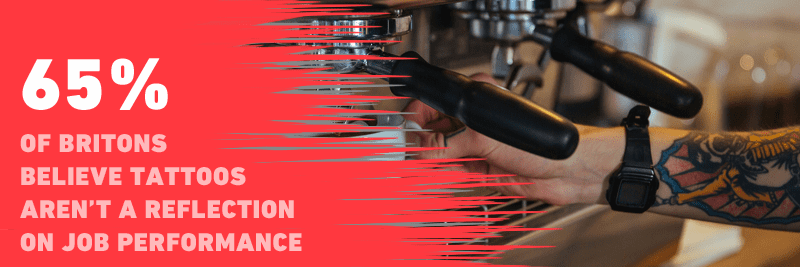Tattoos of all shapes, sizes and designs are more popular than ever – YouGov Survey Data from 2015 revealed that almost 1 in 5 people in Britain have had a tattoo of some description, meaning that there’s a very high chance someone in your workplace possesses a tattoo, be it visible or hidden. For many years, tattoos have been a divisive topic where employment is concerned, with the rules around employment law very much a grey area.
In the past, tattoos have been strongly considered a part of a counterculture – a statement of difference. Today, tattoos are more common than ever and for the most part viewed with neutrality as a perfectly normal addition to a person’s character and appearance.
We recently conducted a survey of the British public, finding that 65% of the UK believe that a person’s visible tattoos should not be held against them when going for a job interview. Perhaps unsurprisingly, due to the high influx of tattoos amongst the younger generation, as many as 77% of the 18-24 age group strongly disagreed with the perception that tattoos are an indicator of someone’s personality and ability to do a job.
Our study also revealed some interesting statistics around gender differences, suggesting that women were more in favour of removing the stigma that has traditionally surrounded tattoos in the workplace (73%), compared to a lower number of men in favour (63%).
The Employment Law Grey Area
Despite the majority of people being in favour of removing any stigmas attached to body art, and the 65% majority that believe that tattoos are not a reflection of someone’s ability to do a job, the topic of employment law is still very much a grey area when it comes to regulations around hiring and discrimination.
The decision to employ or decline is in the hands of the employer, however employees have the right to not be subjected to discrimination based on ‘projected characteristics’. Tattoos do not currently fall under this remit, much to the displeasure of some. There is a growing belief that it should be made illegal for employers to discriminate against candidates who have visible tattoos, whilst some arguments have been made against the complications of a blanket law that enforces this.
According to Thorntons Law, “employers have considerable discretion as to how they deal with employees (or the recruitment of those) with tattoos, as having a prominent tattoo can still have social and cultural stigma attached to it.”
Our survey data also revealed that in the 35-44 category, there was a 50/50 split between the responses of whether tattoos are an indicator of someone’s personality and ability to do a job. With a large proportion of business decision makers falling into this category, it makes for a seemingly unbalanced opportunity when it comes to landing a job with visible tattoos.
Phil Turner, Head of Digital at Direct365, commented: “Whilst tattoos are consistently becoming more and more popular, I still believe that people who have them (particularly visible ones) are perceived differently in the workplace to a certain extent.
“I can understand that some employers, especially those that work closely with the public and/or high-profile clients, may be against the idea of recruiting someone with visible tattoos.
“However, in modern Britain there’s a growing argument that it should not matter about a candidate’s appearance. Whether or not they’re hired should be purely based on their skillset, what they can bring to the role and how they fit in with the company’s ethos.”
Back
